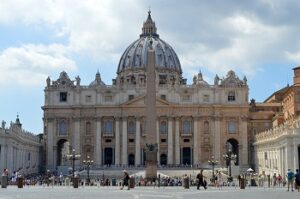Vatican Puts Out the Call for Whistleblowers

The Vatican wants to hear from whistleblowers. This comes from the Vatican’s recent release of a new Whistleblower Procedure, which outlines the Vatican’s official enlistment of Church insiders to help keep the Holy House in order when it comes to financial fraud and corruption. According to a post in Vatican News, the official news portal of the Vatican Holy See, the new procedure, which took effect last week (February 1), “will facilitate the dissemination of knowledge and the possibility of whistleblowing, . . . one of the most effective tools for combating corruption.”
This is big news for the Catholic Church, which according to a recent Reuters article is “no stranger to financial scandals.” And apparently it is part of Pope Francis’ “efforts to install financial transparency and combat corruption” with the help of the Office of the Auditor General (OAG) he established in 2014.
Here are the essentials of how the Vatican hopes to accomplish all this with the help of whistleblowers.
- Who. A whistleblower may be anyone “who in the course of their own work becomes aware of particular situations.” This pretty much covers anyone who works for or with the Vatican or Holy See and its various institutions, including employees, officials, advisors, clients, suppliers, and contractors.
- What. The reported concerns generally must relate to financial fraud or corruption, or in the words of the procedure: “anomalies in the use or allocation of financial or material resources,” “irregularities in the award of contracts or in the performance of transactions or disposals,” or “acts of corruption or fraud.” It may also include “conduct aimed at obstructing the submission of reports, violating the relevant obligations of professional secrecy or discriminating against the whistleblower.”
- What Not. A whistleblower may not report on “grievances of a personal nature” or “that fall within the discipline of the employment relationship or relations with the hierarchical superior or colleagues.”
- How. Whistleblowers may report their concerns to the OAG through a dedicated email address or by letter. They also may report orally by videoconference or in-person meeting. The report must include: the whistleblower’s name, personal data and contact details, and the underlying facts surrounding the complaint. Supporting documentation is also encouraged.
- Confidentiality. Whistleblowers may not report anonymously. However, the OAG is required to safeguard the confidentiality of the whistleblower and the substance of the submission. This applies to anyone involved in analyzing the whistleblower’s report. This information can only be disclosed to the Vatican Judicial Authority when necessary for the investigation or judicial activity.
- Immunity. The reporting of potential misconduct made in good faith cannot expose the whistleblower to liability for any breach of official secrecy obligations or of any other disclosure constraints in any legal, administrative, or contractual provisions.
- Investigation Timeline. Once the whistleblower makes the report, the OAG must conduct its investigation under a strict timeline, which requires notifying the whistleblower after receiving the report (within 30 days) and of the outcome of the investigation (within three months of the notice of receipt, which can be extended with notice to the whistleblower).
In announcing the new procedure, OAG Auditor General Alessandro Cassinis Righini highlighted what the OAG sees as the ultimate benefit of the new Whistleblower Procedure.
The issuance of the procedure will give even greater impetus to the reports, already received by the Office of the Auditor General in previous years, making it easier, especially through the electronic channel, to send them. The procedure also clarifies the scope of admissible and excluded reports, as well as the fact that those who legitimately entertain economic relations with the Holy See and the Vatican City State are also included among the legitimized subjects.
There is little question the Vatican is directing its new whistleblower initiative towards uncovering serious wrongdoing. As Reuters jests in its reporting of the program, it is “reserved for serious offences and not petty moaning about a boss or colleague.”
So hats off to the Vatican for recognizing the value of whistleblowers and creating what will hopefully be a safe and secure channel for reporting financial fraud and corruption. It is a powerful step in the right direction of self-policing how the Vatican conducts its business.
Read More
Tagged in: Importance of Whistleblowers, International Whistleblowers, Whistleblower Eligibility,